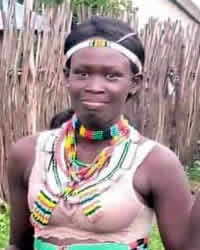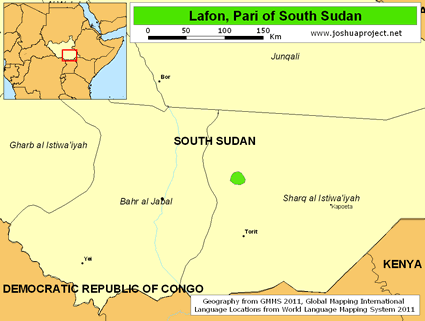The Pari live in South Sudan in an area east of the Nile River. They live around Lafon Hill, a small rocky elevation that rises abruptly out of the surrounding plain and is completely covered with terraced, Pari villages. Although they are a Nilotic group, the Pari are isolated from other Nilotes and are more closely connected with groups such as the Bari. Nilote is a term once used to refer to those people occupying the upper Nile Valley. It now also includes those peoples in surrounding areas who have the same physical, linguistic, and cultural characteristics as those living in the upper Nile Valley.
The Pari have had close contact with the Dinka and Nuer groups who invaded and raided them in years past. The Pari also have been influenced by the Anuak, who occupy a large area north of them. The two groups share many cultural similarities. Some see the Pari as a branch of the Anuak and claim that the two were once one group.
The Pari economy centers on the raising of cattle. The land around the terraced villages is used as grazing grounds for cattle and smaller herds. Some of the land is also used for cultivation; however, because there is no water on the hill itself, water must be brought from nearby pools. The entire Pari population lives on the hill and is divided into sections and villages. The warriors and hunters live near the foot of the hill, while the elderly live further up the hill.
Generally, the Pari are led into battles and are governed by a chief whose office is hereditary. The chief settles disputes from the various villages, and a headman from each village handles day-to-day affairs. The headman is also in charge of all village ceremonies and keeps in his possession the village drums and ancient Pari relics. The tribesmen show him respect by cultivating his land and bringing him gifts of meat and fish. If the headman loses the villagers' support by being a weak leader, he is expelled from the village, taking nothing with him but his wives.
The Pari are divided into clans. Since most clan members live in the same village, a strong sense of unity exists among the members. Marriages between clans are common, and children are usually betrothed when they are quite young. Each year, until the bride-to-be is old enough to marry, the groom must give sheep or goats to his future in-laws as a bride-price.
Nearly all of the Pari are animists who follow their traditional ethnic religion. An animist believes that non-human objects have spirits. The Pari also believe in an all-powerful spirit named Juok, who is regarded as the creator of all things. When someone is sick or when someone wants revenge, an animal is sacrificed to Juok for help. Unlike many African tribes in South Sudan which have mediator spirits or priests to intercede on behalf of the people, the Pari pray directly to Juok.
The Pari practice divination and magic. The cijor is a type of sorcerer who exercises magical powers against those he envies. He puts curses on those who have done wrong to someone else. Elderly people who are unable to avenge themselves often resort to using these curses.
The Pari tribesmen also have what are known as "rain makers." The ritual of rain making involves the sacrifice of a bull and goat. The animals' blood is poured on a grinding stone and placed in the chief's hut. The rain makers dip their hands in water and shake them over the ashes of the bull and goat. Clouds of steam then begin to arise. The villagers remain in their huts, quiet until the sun rises, hoping for rain.
Mission agencies may be currently working among the Pari. Very few Pari are Christians. Much prayer is needed so that the people's hearts will be open to receiving the Gospel.
Ask the Lord to send forth Christian laborers who understand the culture and needs of the Pari.
Ask the Holy Spirit to grant wisdom and favor to missions agencies working among the Pari.
Pray that God will save key Pari leaders who will boldly share the love of Christ with their own people.
Ask God to raise up prayer teams who will begin breaking up the soil through worship and intercession.
Ask the Lord to bring forth a strong and growing Pari church for the glory of His name!
Scripture Prayers for the Pari in South Sudan.
| Profile Source: Bethany World Prayer Center |











